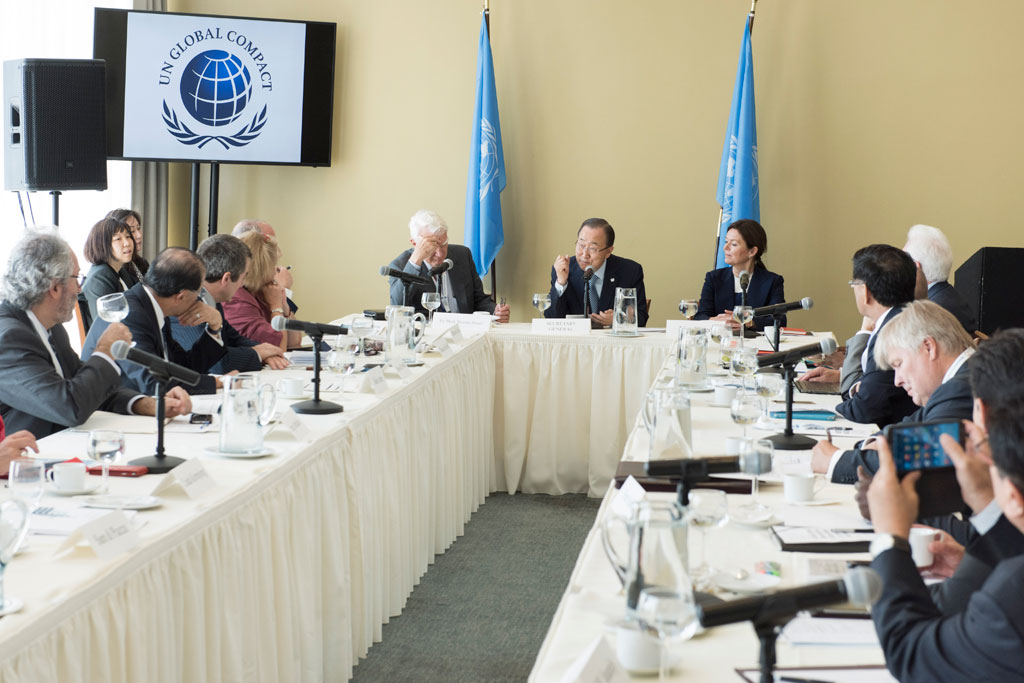
United Nations Secretary-General Ban Ki-moon today rallied corporate leaders and entrepreneurs gathered for a summit in New York to focus on key areas required to reach a new era of sustainability, including responsible practices, transformative partnerships, breakthrough innovation and targeted investment.
In his remarks to the 2016 UN Global Compact Leaders Summit, Mr. Ban stressed that achieving the aims of the 2030 Agenda for Sustainable Development would require finding new ways of living that would end the suffering, discrimination and lack of opportunity for billions of people around the world.
As such, he called on all stakeholders – from world leaders and chief executives, to educators and philanthropists, and across all sectors and industries – to work together in broader and deeper partnerships.
The UN Global Compact , the world’s largest corporate sustainability initiative, supports companies to do business responsibly by aligning their strategies and operations with Ten Principles on human rights, labour, environment and anti-corruption; and to take strategic actions to advance broader societal goals, such as the UN Sustainable Development Goals (SDGs), with an emphasis on collaboration and innovation.
The Leaders Summit, which is running in New York through tomorrow, aims to jump-start business action everywhere on the Goals. To that end, the Global Compact unveiled a multi-year strategy to drive business awareness and activity that supports the achievement of the Goals by 2030.
Key elements of the new ‘Making Global Goals Local Business’ strategy include an annual Leaders Summit, the SDG Pioneers programme, Local Network SDG Action Plans, UN-business partnerships, and impact reporting.
Recalling the adoption last year of both the SDGs and the Paris Agreement on climate change, the Secretary-General in his remarks said sustainable development could be separated from fighting the impacts of climate change, and called for a holistic development model will take climate impact and fragile ecosystems into account, and would benefit both people and the planet.
Noting that trillions of dollars will be invested in infrastructure in the coming years, he said that the Paris Agreement and the SDGs give the private sector an unprecedented opportunity to create clean-energy, climate-resilient, sustainable economies.
“We are at a decisive moment in the shift to sustainable and inclusive markets,” continued the Secretary-General, noting that the first step in this regard would be to mobilize the global business community as never before. “All businesses, everywhere, can and should play a role in improving our world. That starts with integrity – doing business right,” he said.
“I have seen first-hand the power of the UN Global Compact’s Ten Principles […] They are helping thousands of companies contribute to sustainability,” he said asking each of the corporate leaders and entrepreneurs participating in the Summit to renew commitment to principled business, “and to speak up for the UN Global Compact.”
Next, he said innovation will be crucial. “I urge you to take advantage of the new markets and solutions that are emerging; to set corporate goals inspired by the SDGs; and to let sustainability drive innovation and investment,” he stressed.
“The UN Global Compact is uniquely prepared and positioned to lead business in the SDG era,” said Mr. Ban. “Achieving the SDGs will require unprecedented cooperation, radical innovation and extraordinary leadership. And it will require us each to be a pioneer, forging ahead into new territory.”
That would mean, the UN chief continued, “taking personal and corporate responsibility for how we do business and who we choose as our staff and partners. It means taking stock of our decisions as consumers and investors. It means raising our voices and taking a stand when it matters. The United Nations Global Compact is the forum to make all this happen.”
In her remarks, Lise Kingo, Executive Director of the UN Global Compact said: “The Leaders Summit is the first step on a long-term journey to engage business on the 2030 Agenda. The expectations on business in the new SDG era are immense, but at the same time the opportunities are enormous.”
“We need to invent, develop and launch countless new ideas and solutions within a very short time. Through our Making Global Goals Local Business strategy, we will build a powerful global movement of companies doing business responsibly and innovating around the SDGs to create the world we want,” she stressed.
Noting that the Global Compact’s Ten Principles are “simply good business,” she explained that the principles provide a common ground for partners, a moral code for employees, an accountability measure, and ultimately are the foundation for building trust across the board.
Underscoring the value of the SDGs for businesses, she said that addressing challenges ranging from inequality and conflict, to unemployment and climate change, the global goals reflect the complex, interconnected operating environments that businesses face around the world.
The Global Compact Executive Director also added that SDGs not only identify where the global community has to be in 2030 to create a sustainable world in which nobody is left behind, they also outline new markets and opportunities for companies all over the world.
To succeed, she said “we must turn the global goals into business action and impacts in markets around the world.”
“There is no doubt that this is a daunting agenda. At the same time, the opportunities at hand are enormous. Global challenges – whether related to food and water crises, or conflict and inequality – are in need of solutions from all sectors, including business,” she added.
In an impassioned plea at the Summit, she called on all to “seize the day and work together” to achieve the SDGs by turning risks into opportunities, and creating the world we want. “There is so much we can accomplish together – and we have only just begun. And there is no Plan B,” she said.











